Кой излиза с Екатерина II?
Alexander Yermolov от Екатерина II от ? до ?.
Ivan Rimsky-Korsakov от Екатерина II от ? до ?. Разликата във възрастта беше 24 години, 8 месеца и 22 дни.
Alexander Dmitriev-Mamonov от Екатерина II от ? до ?. Разликата във възрастта беше 29 години, 4 месеца и 28 дни.
Alexander Lanskoy от Екатерина II от ? до ?. Разликата във възрастта беше 28 години, 10 месеца и 6 дни.
Sergei Saltykov от Екатерина II от ? до ?.
Pyotr Zavadovsky от Екатерина II от ? до ?. Разликата във възрастта беше 9 години, 8 месеца и 19 дни.
Semyon Zorich от Екатерина II от ? до ?.
Alexander Vasilchikov от Екатерина II от ? до ?.
Platon Zubov от Екатерина II от ? до ?. Разликата във възрастта беше 38 години, 6 месеца и 24 дни.
Григорий Потьомкин от Екатерина II от ? до ?. Разликата във възрастта беше 10 години, 4 месеца и 22 дни.
Grigory Orlov от Екатерина II от ? до ?. Разликата във възрастта беше 5 години, 5 месеца и 15 дни.
Станислав Август Понятовски от Екатерина II от ? до ?. Разликата във възрастта беше 2 години, 8 месеца и 15 дни.
Екатерина II
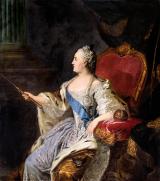
Екатерина II (на руски: Екатерина II), родена София Августа Фредерика фон Анхалт-Цербст (на немски: Sophie Auguste Friederike von Anhalt-Zerbst-Dornburg), с православно име Екатерина Алексеевна (на руски: Екатерина Алексе́евна), още приживе известна като Екатерина II Велика е императрица и самодържица на Русия от 1762 г. до смъртта си през 1796 г.
Дъщеря е на принцесата на Шлезвиг-Холщайн-Готорп и княза на Анхалт-Цербст, Екатерина II идва на власт в резултат на дворцов преврат, който сваля от престола нейния непопулярен съпруг Петър III.
Епохата на Екатерина II е белязана от максималното поробителство на селяните и всестранното разширяване на привилегиите на благородническото съсловие.
При Екатерина Велика границите на Руската империя са значително разширени на запад (Поделби на Жечпосполита) и на юг (анексиране на Новорусия, Крим и отчасти Кавказ).
При Екатерина II системата на управление е реформирана за пръв път след управлението на Петър I.
В културно отношение Русия най-накрая се превръща в една от водещите европейски сили, като значителна заслуга за това има самата императрица, която е любител на литературната дейност, събира шедьоври на живописта и си кореспондира с френски просветители. Като цяло политиката на управление на Екатерина II Алексеевна често е наричана „Златен век“ и е сочена като пример за просветен абсолютизъм.
Пълната титла на императрица Екатерина II е С Божията милост, Ние, Екатерина Втора, императрица и самодържица всерусийска, московска, киевска, владимирска, новгородска, царица казанска, царица астраханска, царица сибирска, господарка псковска и велика княгиня смоленска, княгиня естландска, лифландска, карелска, тверска, югорска, пермска, вятска, българска и други, господарка и велика княгиня новгородска, на ниските земи, черниговска, рязанска, ростовска, ярославска, белозерска, удорска, обдорска, кондийска и на всички северни земи повелителка, и господарка на иверските земи, на карталинските и на грузинските царе и на кабардинските земи, на черкаските и на горските князе и на други, наследствена господарка и притежателка.
Прочетете повече...Alexander Yermolov

Alexander Petrovich Yermolov (1754–1834) was a Russian favourite and the lover of Catherine the Great from 1785 to 1786.
Yermolov was presented to Catherine by Grigory Potemkin, tested by Anna Protasova and became Catherine's lover in 1785. He collaborated with the enemies of Potemkin and attempted to have Potemkin removed, and thereby lost his position. He went to Paris in the late 1780s and spent the rest of his life in Schloss Frohsdorf.
Прочетете повече...Екатерина II

Ivan Rimsky-Korsakov

Ivan Nikolajevich Rimsky-Korsakov, né Korsav (29 June 1754 – 31 July 1831 in Saint Petersburg, Russian Empire) was a Russian courtier and lover of Catherine the Great from 1778 to 1779.
Прочетете повече...Екатерина II

Alexander Dmitriev-Mamonov

Count Alexander Matveyevich Dmitriev-Mamonov (Russian: Александр Матвеевич Дмитриев-Мамонов; 30 September 1758 – 11 October 1803, buried in Donskoy Monastery) was a lover of Catherine II of Russia from 1786 to 1789.
Прочетете повече...Екатерина II

Alexander Lanskoy
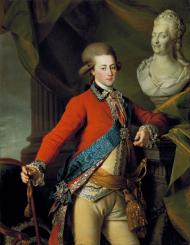
Alexander Dmitrievich Lanskoy, also called Sashin'ka or Sasha, (19 March [O.S. 8 March] 1758 – 6 July [O.S. 25 June] 1784) was a Russian general, favourite and lover of Catherine the Great between 1780 and 1784. It has been said that "[a] look at [her] correspondence with her favorites gives the impression she only had tender feelings for one, Alexander Lanskoi."
Прочетете повече...Екатерина II

Sergei Saltykov

Count Sergei Vasilievich Saltykov (Russian: Сергей Васильевич Салтыков, IPA: [sʲɪrˈɡʲej vɐˈsʲilʲjɪvʲɪtɕ səltɨˈkof]; c. 1722 – 1784) was a Russian officer (chamberlain) who became the first lover of Empress Catherine the Great after her arrival in Russia.
Прочетете повече...Екатерина II

Pyotr Zavadovsky
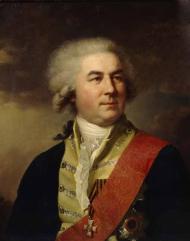
Le comte Piotr Vassilievitch Zavadovsky (Пётр Васильевич Завадовский), né à Krasnovitchi, près de Briansk le 10 (21) et mort le 10 (22) à Saint-Pétersbourg, est un homme politique russe, ministre de l'Instruction publique du au . Il compta semble-t-il au nombre des amants de Catherine la Grande et fut son favori de 1775 à 1777.
Прочетете повече...Екатерина II

Semyon Zorich

Count Semyon Zorich (1743–1799) was a Serbian-born Russian lieutenant-general and count of the Holy Roman Empire. He served Russia against the Prussians and Turks. A member of the Russian court, he was presented to Empress Catherine the Great by Grigory Potemkin and, after having been tested by Praskovja Bruce and doctor Rogerson, became the Empress' lover. He was most influential in the commercial development of Shklov and Mogilev.
Прочетете повече...Екатерина II

Alexander Vasilchikov
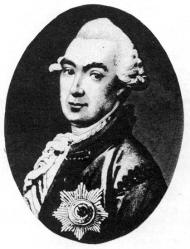
Alexander Semyonovich Vasilchikov (Russian: Александр Семёнович Васильчиков, tr. Aleksandr Semënovič Vasil'čikov; 1746–1813) was a Russian aristocrat who became the lover of Catherine the Great from 1772 to 1774.
Vasilchikov was an ensign in the Chevalier Guard Regiment when he was noted by Catherine and was appointed gentleman of the bedchamber on 1 August 1772. When Catherine's then-lover Grigory Grigoryevich Orlov left court, Catherine was informed about his adultery, and 12 August, Vasilchikov was made general aide-de-camp and lover of Catherine. Vasilchikov was expected to be available to attend on her at all times, and was not allowed to leave the palace without permission.
The relationship was short-lived. Catherine found Vasilchikov's gentleness cloying, saying "His tenderness made me weep." When Vasilchikov was away on a journey, sent by the empress, Grigory Potemkin replaced him as her lover. She wrote to her friend Friedrich Melchior, Baron von Grimm about Vasilchikov's dismissal: "Why do you reproach me because I dismiss a well-meaning but extremely boring bourgeois in favour of one of the greatest, the most comical and amusing, characters of this iron century?"
Vasilchikov later complained that he felt like a hired gigolo: "I was nothing more to her than a kind of male cocotte and I was treated as such. If I made a request for myself or anyone else, she did not reply, but the next day I found a bank-note for several thousand rubles in my pocket. She never condescended to discuss with me any matters that lay close to my heart."
Catherine characteristically rewarded her former lover richly. Vasilchikov was given a pension of twenty thousand rubles and valuable properties. He lived the rest of his life in Moscow. He never married. He built a notable collection of Western European paintings and sculptures, including a "Self Portrait" by Velasquez and works by Philips Wouwerman and Andries Botha.
Прочетете повече...Екатерина II

Platon Zubov
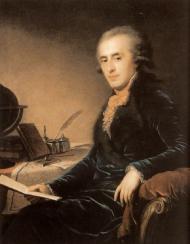
Prince Platon Alexandrovich Zubov (Russian: Платон Александрович Зубов; November 26 [O.S. November 15] 1767 – April 19 [O.S. April 7] 1822) was the last of Catherine the Great's favourites and the most powerful man in the Russian Empire during the last years of her reign.
Прочетете повече...Екатерина II

Григорий Потьомкин
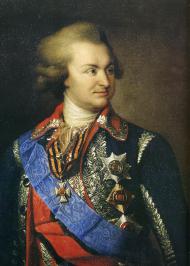
Prince Grigory Aleksandrovich Potemkin-Tauricheski (11 October [O.S. 30 September] 1739 – 16 October [O.S. 5 October] 1791) was a Russian military leader, statesman, nobleman, and favourite of Catherine the Great. He died during negotiations over the Treaty of Iași, which ended a war with the Ottoman Empire that he had overseen.
Potemkin was born into a family of middle-income landowners of Russian nobility. He first attracted Catherine's favor for helping in her 1762 coup, then distinguished himself as a military commander in the Russo-Turkish War (1768–1774). He became Catherine's lover, favorite and possibly her consort. After their passion cooled, he remained her lifelong friend and favored statesman. Catherine obtained for him the title of Prince of the Holy Roman Empire and gave him the title of Prince of the Russian Empire among many others: he was both a Grand Admiral and the head of all of Russia's land and irregular forces. Potemkin's achievements include the peaceful annexation of the Crimea (1783) and the successful second Russo-Turkish War (1787–1792), during which the armed forces under his command besieged Ochakov.
In 1775, Potemkin became the governor-general of Russia's new southern provinces. An absolute ruler, he worked to colonize the wild steppes, controversially dealing firmly with the Cossacks who lived there. He founded the towns of Kherson, Nikolayev, Sevastopol, and Yekaterinoslav. Ports in the region became bases for his new Black Sea Fleet.
His rule in the south is associated with the (probably mythical) "Potemkin village", a ruse involving the construction of painted façades to mimic real villages, full of happy, well-fed people, for visiting officials to see. Potemkin was known for his love of women, gambling and material wealth. He oversaw the construction of many historically significant buildings, including the Tauride Palace in Saint Petersburg.
Прочетете повече...Екатерина II

Grigory Orlov

Prince Grigory Grigoryevich Orlov (Russian: Григорий Григорьевич Орлов; 17 October 1734 – 24 April 1783) was a favourite of the Empress Catherine the Great of Russia, Prince of the Holy Roman Empire (1772), state and military figure, collector, patron of arts, and General-in-Chief.
He patronised M. V. Lomonosov, D. I. Fonvisin, V. I. Bazhenov and gave them financial support. Honorary member of the Imperial Academy of Arts (since 1765). He collected paintings (including Rembrandt, P. P. Rubens, Titian), sculpture, Chinese, Japanese and Russian porcelain, hunting weapons, etc. (Orlov's collection has been preserved almost completely; it is now in the State Museum-Reserve "Gatchina" of the eponymous city). A large landowner, particularly of the Gatchina manor, where Orlov commissioned the construction of a palace and a landscape garden.
He became a leader of the 1762 coup which overthrew Catherine's husband Peter III of Russia and installed Catherine as empress. For some years he was virtually co-ruler with her, but his repeated infidelities and the enmity of Catherine's other advisers led to his fall from power.
Прочетете повече...Екатерина II

Станислав Август Понятовски

Стани́слав II А́вгуст Понято́вски (Станислав Антони Понятовски) (на полски: Stanisław August Poniatowski, на литовски: Stanislovas Augustas Poniatovskis, на беларуски: Станіслаў Аўгуст Панятоўскі) е последният полски крал и велик княз литовски, управлявал в периода 1764 – 1795, един от фаворитите на руската императрица Екатерина II.
Прочетете повече...